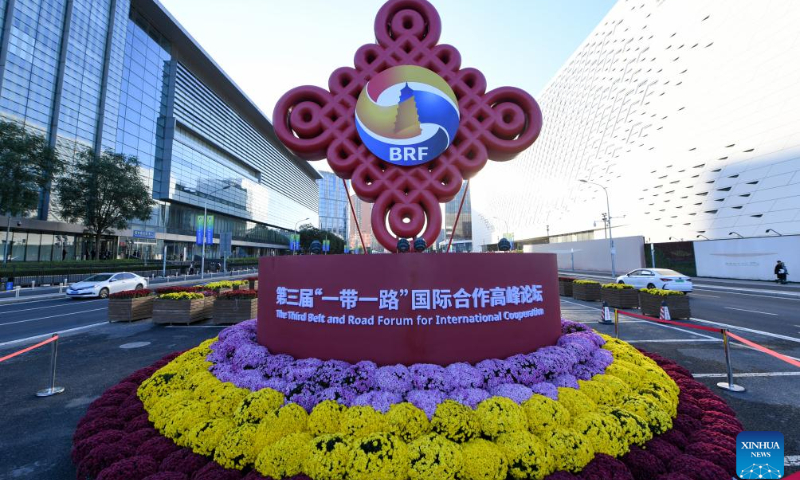The curtain has come down on the third Belt and Road Forum for International Cooperation (BRF) in Beijing, one of China’s most important diplomatic events this year, but its profound significance is set to reverberate across the world for years to come.
The momentous event, marking the 10th anniversary of the Belt and Road Initiative (BRI) and ushering in what President Xi Jinping called another “golden decade” of BRI cooperation, was a “complete success,” with nearly 460 outcomes achieved and over 10,000 participants from more than 150 countries and 40 international organizations having attended, Chinese officials said.
Such fruitful results not only highlighted the remarkable achievements of the BRI over the past decade and solid confidence of participating countries from across the globe in the initiative, but also pointed to a clear path for high-quality development in the future, with a new focus on areas including digital and green development, forum participants and experts said.
Beyond the concrete initiatives and agreements at the BRF, the gathering in the Chinese capital also put on a vivid display of China’s approach of peaceful development and win-win cooperation resonating with the aspirations of the vast majority of the international community, while the US and some of allies’ approach of confrontation, exclusion and decoupling was rejected, experts noted.
Eying new ‘golden decade’
The two-day BRF began on Tuesday, with Xi setting the theme for the event. At a banquet he hosted to welcome guests attending the BRF, the Chinese President stressed cooperation and development in the pursuit of what he called another “golden decade” for the initiative.
“Belt and Road cooperation, robust and fruitful in its first decade, is now full of dynamism and vitality. We must embark with drive and enthusiasm on the new journey toward another golden decade,” Xi said, according to the Xinhua News Agency.
This has been reflected in the agenda as well as the major outcomes of the forum. On Wednesday at the opening ceremony, Xi announced eight major steps China will take to support high-quality Belt and Road cooperation, including building a multidimensional Belt and Road connectivity network, supporting an open world economy, promoting green development and advancing scientific and technological innovation.
Specifically, China vowed more financing support for BRI projects on the basis of market and business operation, with two policy banks each setting up a 350 billion yuan ($48.75 billion) financing window and an additional 80 billion yuan injected into the Silk Road Fund. China will carry out 1,000 small-scale livelihood assistance projects. In the technological field, the Global Artificial Intelligence (AI) Governance Initiative was launched, offering an open, inclusive and fair approach for the development, security and governance of AI.
The BRF achieved a total of 458 outcomes, far exceeding the number at the second BRF in 2019. The outcomes include initiatives on deepening connectivity, green development and cooperation in the digital economy. Business deals worth $97.2 billion were also reached at the CEO Conference held during this forum. China also signed a slew of bilateral agreements with many countries, including a free trade agreement with Serbia.
Calling the forum a “complete success,” Chinese Foreign Minister Wang Yi said on Wednesday that “the most important consensus reached at this forum is to open a new stage of high-quality Belt and Road cooperation.”
Wang said that the success of the BRF once again showed that the direction of the BRI is correct, partners’ confidence in the BRI is firm and the prospect of the BRI’s high-quality development is bright. “The forum also shows that peaceful development and win-win cooperation are the general trend and the aspiration of the people. Cold war confrontation and decoupling are against the historical trend and have no way out,” he said in pointed remarks.
The BRF came at a time when the world is facing an anti-globalization tide and heightened geopolitical rivalry spearheaded by the US. The US and its allies have also been sparing no efforts in smearing the BRI, and are even trying to come up with their own “alternatives” to the BRI. However, such ill-intended attempts have not and will not derail the BRI, experts noted.
“Unlike the US, China has adopted an inclusive approach, which is in line with the aspirations of the international community for peace, development and cooperation,” Sun Yanhong, an expert at the Chinese Academy of Social Sciences, told the Global Times on Thursday, noting that such an approach continues to help expand China’s “circle of friends.”
Many experts also drew the stark comparison between the message of peace, development and cooperation from the BRF in the Chinese capital and the US’ support for deadly conflicts in Europe and in the Middle East. It’s striking that while Chinese and global leaders talked about development and cooperation, US President Joe Biden visited Israel to “show solidarity” in Israel’s war in Gaza despite a worsening humanitarian crisis. Many Western leaders have also followed Biden’s suit.
Pinning hope on China
At a time of rising anti-globalization tides and geopolitical rivalry when confidence in global development has been seriously undercut and risks have increased, the strong show at the BRF indicates that many in the international community are pinning their hopes for development on China, experts said.
“Indeed, the developing world has placed more expectations for development on China,” Song Wei, a professor at the School of International Relations and Diplomacy at the Beijing Foreign Studies University, told the Global Times on Thursday.
Song said that major achievements from the BRF include greater support for infrastructure projects with improved and diversified financing tools and various initiatives for cooperation in green and digital development also meet the new needs among BRI partner countries as well as address climate change and other global issues.
The BRI’s focus on green and digital development in the next stage of development, in addition to connectivity has also drawn widespread applause from global partners.
“Together, with the contributions of the Belt and Road Initiative, we can turn the infrastructure emergency into an infrastructure opportunity, supercharge the implementation of the sustainable development goals, and deliver hope and progress for billions of people and the planet we share,” UN Secretary-General António Guterres said at the BRF on Wednesday.
Global businesses also welcomed China’s initiative for cooperation in green development technologies.
“When you come here, you understand the BRI and you see what a great initiative it is. I think it’s just getting bigger and bigger,” Aidan Heavey, chairman of Eurasia Fund, who attended the BRF, told the Global Times, noting that China’s leading technologies and companies in renewable energy are what “the rest of the world needs.”
Allan Zeman, a business magnet based in Hong Kong, also said that China has become a leading country in technologies and is getting stronger and stronger. “I think that China will be the one to help these 150 countries [BRI partners], [most of] which really don’t have good access to technology,” he told the Global Times on the sidelines of the BRF.
Beyond cooperation in infrastructure, green development and technologies, people-to-people exchanges will also remain an integral part of BRI cooperation, experts said.
“We hope that the people-to-people exchange will move closer and become more convenient,” Thapanee Kiatphaibool, governor of the Tourism Authority of Thailand, told the Global Times on Thursday, noting that a number of agreements were signed at the BRF with Chinese firms and that the number of Chinese tourists in Thailand could reach 4 million this year.
(Global Times)




